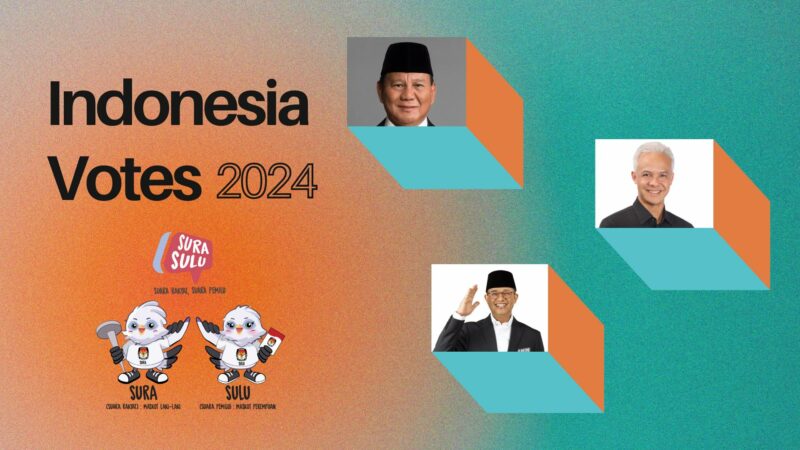
The mascots and the candidates of the 2024 Indonesian Presidential Election. Image by Juke Carolina, used with permission
Indonesia, the world’s third-largest democracy and Southeast Asia’s largest economy, will elect new leaders on February 14.
Around 204 million people in the country and 1.75 million overseas Indonesians are eligible to cast their votes. This is the world’s largest number of voters on a single day this year.
This is only the second time that presidential and legislative elections will be held at the same time. About a quarter-million candidates are vying for 20,000 elected positions.
Incumbent President Joko “Jokowi” Widodo is finishing his second term and is legally barred from seeking a third term. His election victory in 2014 was phenomenal since he was considered an outsider who had no ties to the military, major political parties, and powerful families. He was re-elected in 2019.
The election could decide his legacy and political fate once he steps down from power later this year.
As head of state, Jokowi cannot use his office to campaign for candidates, but it is widely perceived that he is supporting the presidential bid of Defense Minister Prabowo Subianto. Interestingly, Jokowi defeated Prabowo in 2014 and 2019, but they eventually became allies, and the latter became part of the government Cabinet. Prabowo’s running mate is Gibran Rakabuming Raka, the mayor of Solo and Jokowi’s eldest son.
Prabowo is ahead in surveys, which has alarmed some activists because of his controversial record as a former General and son-in-law of Suharto, the former president who ruled the country as a strongman from 1967 to 1998. Prabowo has denied accusations that he kidnapped activists and committed human rights violations.
The presidential candidate of Indonesia’s ruling party is Ganjar Pranowo, the former governor of Central Java. He is likened to Jokowi because they have the same style of communicating with the public, and his candidacy is supported by Indonesia’s former President Megawati Soekarnoputri. Megawati was also Jokowi’s main supporter when he ran for president.
The opposition candidate is Anies Baswedan, the former governor of Jakarta and Jokowi's one-time education minister. His election victory as governor in 2017 was credited to the endorsement of hardline Islamist groups. Indonesia is the fourth largest country in the world and has the largest Muslim-majority population. Anies is running on a platform of “change” and has criticized some of Jokowi’s mega projects, like the building of a new capital in Nusantara in Borneo.
As the campaign period draws to a close, candidates are urged to address human rights concerns in their electoral agenda. Under the Jokowi government, a new criminal code was passed, but critics pointed out that repressive colonial-era provisions had been retained.
The support of young citizens and first-time voters is crucial since this population segment represents around 52 percent of the total number of voters. This is the reason why candidates have deployed “buzzers” and “cyber troopers” to boost their campaigns on social media. Unfortunately, these paid online campaigners also engage in “black campaigning” by spreading disinformation. To counter this trend, several initiatives were launched by civil society groups like the Fact-Check Expert Panel, which mobilized academics and researchers from more than 40 institutions to ensure truth and transparency during the campaign period.
If no presidential candidate receives majority votes on February 14, a second round of run-off elections is scheduled on June 26. The new government is expected to be inaugurated on October 20.
The stories below provide more context and updates about the elections.
Stories about Indonesia: Elections and democracy
Lessons from Indonesia's 2024 election: Social media, censorship, and youth vote
During the elections, generative AI content was used in the campaigns by many parties and there were a variety of attitudes towards its use.
Indonesia announces election winners amid protests and fraud allegations
"We think it is reasonable for the public to question the election results, based on the process that is suspected to be fraudulent and problematic."
Indonesian presidential winner charms youth vote with dances, TikTok, and cats
The winner of Indonesia's presidential election courted the archipelago's youth vote with catchy music, TikTok dances, and photos of cats. However, some aren't forgetting his previous human rights abuses.
‘Dirty Vote’ documentary on alleged election fraud goes viral in Indonesia
The documentary suggested Indonesia's current president, Joko Widodo (nicknamed "Jokowi") used his position to support the candidacy of his defense minister, Prabowo Subianto, who has sparked countless human rights concerns.
Young voters share demands ahead of Indonesian elections
"They all have their strengths and weaknesses. It’s hard and I need to decide carefully because we are all choosing who will lead this country for the next five years."
Can Indonesia's President Jokowi remain neutral while his son runs for vice president?
"We have the moral obligation to remind him to stay neutral in the election and that history will not judge him kindly for interfering with the democratic process."
Indonesian candidates urged to address human rights concerns
"Indonesia continues to fail to guarantee people’s rights to express their opinions peacefully amidst a shrinking civic space."
Cyberbullying hinders women’s participation in Indonesia’s 2024 elections
"Online attacks ramp up during elections which now also involve cyber troops running campaigns in the digital world and targeting women."
How Indonesia’s ‘illiberal cyberlaw’ undermines free speech and human rights
"We regret that the Indonesian Parliament has passed the amendment to the ITE Law, which contains problematic articles that undermine freedom of expression and freedom of the press."
Indonesia is still moving its capital to Nusantara despite rising public opposition
In a nearly unprecedented move, the Indonesian government is creating the city entirely from scratch and has cleared thousands of hectares of forests, fields, and grasslands for the new capital.
How ‘cyber troops’ influence Indonesia's politics, policies, and media landscape
"For citizens, in general, I think people need to learn more — to be more skeptical with what is viral on social media." - Indonesian digital media researcher Wijayanto.












